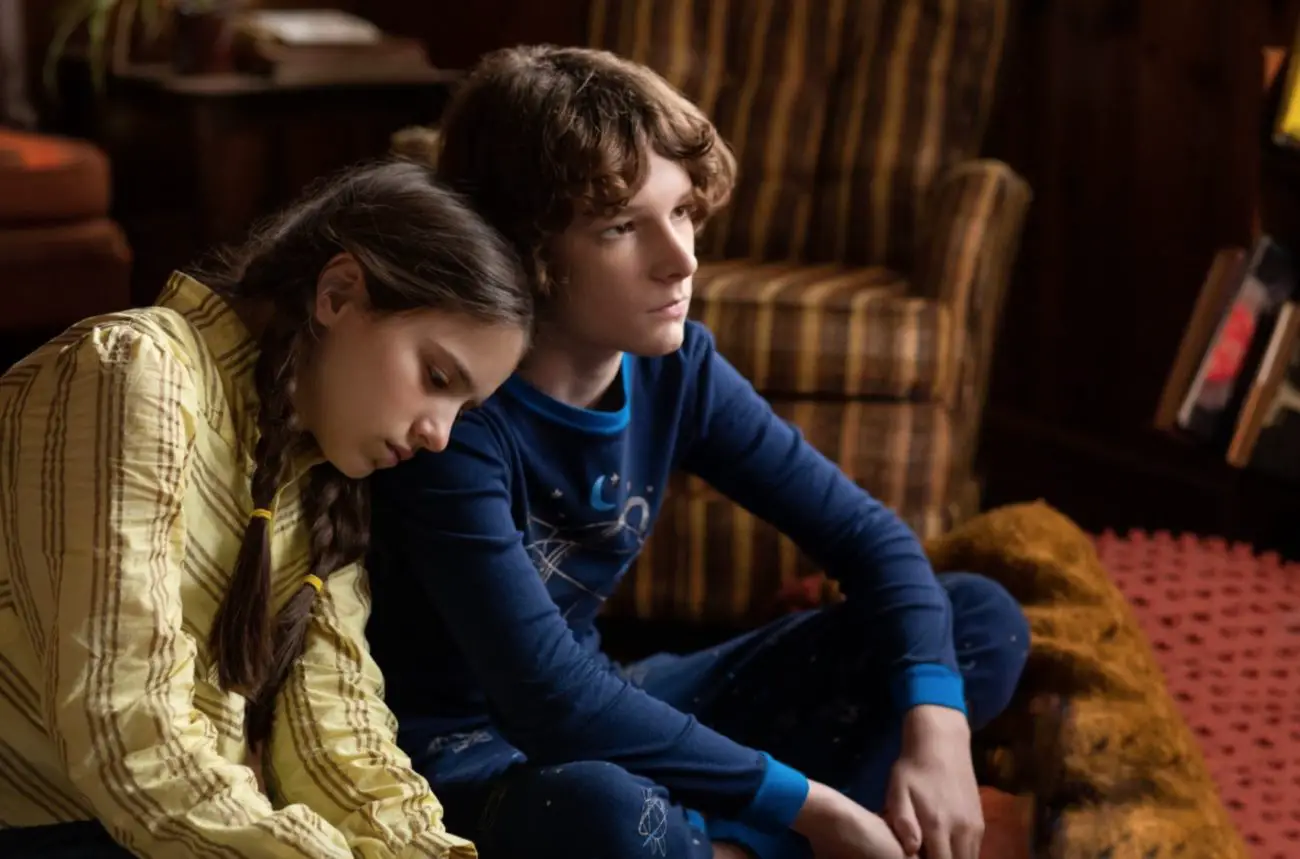In the 1970s Denver setting of The Black Phone, there’s a shadowy figure known as The Grabber (Ethan Hawke). He terrorizes the suburbs by kidnapping children on their way home from school. A paperboy (Jacob Moran), a pinball wizard (Brady Hepner), and a baseball star (Tristan Pravong) are some of his victims. Once taken by The Grabber, the kids are never seen again.
Finney (Mason Thames) and Gwen (Madeleine McGraw) are siblings who live in the suburbs of Denver, Colorado. Finney is very reserved and often on the receiving end of bullying because of his kind nature. Gwen’s personality is the opposite of her brother’s, and she’s one of the best entries ever to be made to the snarky-little-sibling-in-a-horror-movie character list. The two have a close bond that keeps Finney alive when he finds himself locked in The Grabber’s basement as his latest victim.
Hawke has an emotive face that portrays more than any words could. The listening booth scene in Before Sunrise is a prime example of what he can convey without ever saying a word. This makes The Black Phone’s choice to obscure his face with a full or partial mask for the entire film inexplicable. Why would anyone take Hawke’s only horror movie villain role to date and hide it behind a mask? Sure, the mask is unnerving, but think of what could have been! Think of the reveal when the mask is removed to show a face of human horror.

The Black Phone’s production design will make audiences feel comfortable. With all the nostalgia from Stranger Things, IT, and other Stephen King adaptations, a stylized late-’70s, early-’80s is almost synonymous with our current decade in horror, but main plot points play out too closely to King’s works. Instead of the red balloon from IT, there are black balloons. Swap the clown for a magician. There’s even a younger sibling in a bright yellow raincoat. Perhaps these comparisons shouldn’t be too surprising, because the short story of the same name is written by King’s son.
From a technical standpoint, The Black Phone works. The child actors are able to hold their own, the score is reminiscent of John Carpenter, and Hawke is a perfectly menacing shadow figure. The story of missing children in a picturesque small town with a mysterious, larger-than-life figure behind the disappearances is the basis for many a horror movie, but that’s fine, though. Many stories can be retold in an exciting way, especially in this genre. Unfortunately, there’s nothing surprising or unexpected in The Black Phone. It’s a fairly standard horror flick that lacks some of the spark from Derrickson’s beloved Sinister.
In an effort to ramp up the spooky atmosphere, The Black Phone relies on jump scares. It’s disappointing, to say the least. The audience has to suspend disbelief that the titular black phone in the basement allows Finney to speak to the spirits of the other missing boys, but to resurrect these boys as weak jump scares is a step too far. The boys appear in the basement to talk with Finney as ghosts, and this allows the audience to see how The Grabber abused, attacked, and murdered them. Their presence feels shoehorned and unnecessary. It’s as if the studio was too afraid to let the film be the claustrophobic survival movie it could have been.

The main theme of the movie is Finney’s kindness and the fact that he doesn’t like to fight back against bullies. He’s regularly beat up at school and doesn’t step in when his father (Jeremy Davies) abuses Gwen. It’s a strange well to return to, because Finney does fight back against The Grabber when he’s abducted. Finney also works tirelessly in the basement to find a way to escape. The film also seems to justify his father’s violent actions by saying he’s still upset about the loss of his wife.
There are moments of genuine tension that arise over the course of the film. Finney’s attempt to escape, as The Grabber dozes off on the other side of the basement door, causes an audible gasp from the audience. Their hope for Finney is balanced on a razor’s edge, and it’s the best action sequence of the film. Moments like this convince the audience that The Black Phone will become more interesting or inspired. Something more than a paper-thin, generic horror movie, but it’s a false hope.




